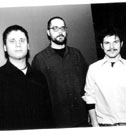
Comment
on this story
What:
Triage with Paradise Island (featuring Jenny from Erase Errata)
When:
Wednesday, May 14, 9 p.m.
Where:
The Pilot Light
Cost:
$3
|
|

Eschewing the academic approach, Triage takes improvisational jazz head on
by Mike Gibson
Chicago's Triage make the kind of music that critics like to call "challenging"—technically daring, sometimes dissonant, marked by shifting tonal centers and drawing purchase from improvisation moreso than composition. It's the kind of music that 30 or 40 years ago would have found sonic and spiritual kinship in the strains of musicians such as Ornette Coleman and Eric Dolphy, the lot of it neatly packaged and labeled (or sometimes dismissed as) Free Jazz.
But while Triage and other like-minded modern improvisers are certainly coming out of that same tradition, saxophonist Dave Rempis suggests the labeling is no longer adequate.
"To me, what a lot of these bands are doing is to draw on other influences, world music or classical music or whatever," Rempis says in a phone interview. "Some people would say it doesn't even fall in the realm of jazz. And that's fine, too. It's all just music."
Today, Chicago is a hub of free improvised music, and the members of Triage, though all under 30, are firmly entrenched as veterans of the scene. Bassist Jason Ajemian currently plays with four other notable Chi-town jazz units. Rempis and drummer Tim Daisy are both members of the Vandermark Five, which is arguably the best-known outfit in free music today, and which is headed by one of its most significant statesman in bandleader Ken Vandermark.
In four years together, the trio has released two records, Triage and Premium Plastics, with a third, Twenty Minute Cliff, soon to come on the Okkadisk label.
Though all three Triagers have had some formal training, and though their music draws on an astonishing breadth of influences, Rempis says the band's approach owes more to the spirit of jazz than to its technical manifestation.
"Most of what we do is not coming out of an academic background," he says. "In many ways, academia can be detrimental to learning jazz. It's a living, breathing music, a music that's learned in clubs and in live performance.
"I played in a traditional jazz quartet in high school (in Boston), and we played a lot of standards. For me, it's been helpful to have that background in traditional jazz, because jazz is all part of a continuum that continually re-digests itself. But it's not essential to have that background. Plenty of people have rejected the straight-ahead stuff and have still done great things."
Rempis says that an understanding of the jazz continuum may be even more important to listeners than to players, in that much modern improvised music, with its relatively amorphous conceptions of rhythm and harmony, can seem scarifying and even artless to the virgin ear.
But just as the melodious sensibilities of big-band jazz laid the foundation for the more stringent bebop that followed, Rempis suggests that a grounding in the work of artists like Coleman and later European improvisers such as saxophonist Peter Brotzmann may enable fans to better grasp the soul of modern improvisation.
"To some people, this music makes sense," Rempis says. "For some people, it's not a huge jump. But if you approach the music chronologically, it makes more sense. If you go straight from traditional jazz to some kind of noise thing, it can be pretty...challenging."
Which is another way of saying "commercially unviable." Like other musicians of their ilk, the members of Triage dabble in a host of side projects, playing out in Chicago sometimes 20 and more times per month. They tour hard—their current jaunt includes 17 shows in 16 cities in less than three weeks—and move most of the records they sell at the concert venues themselves. Even so, Rempis still works regular jobs, bartending at two Chicago-area rock 'n' roll clubs when he's not on the road with Vandermark or Triage.
"This music is not economically rewarding," he laughs. "As a percentage of the music market, jazz represents maybe 4 or 5 percent. And most of that is probably Kenny G.—who doesn't sound very much like us."

March 8, 2003 * Vol. 13, No. 19
© 2003 Metro Pulse
|





